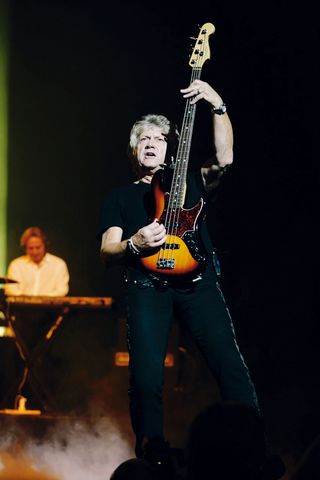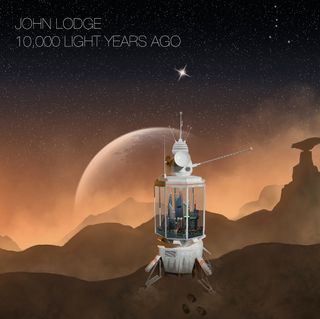10,000 Light Years Ago reunites him with some ex-band members and is, he says, the sort of album he wishes his day-job group would make.
Solo albums by John Lodge are much rarer than lunar eclipses. Once in a Moody Blue moon, indeed. But the happy marriage between the bassist and joint frontman with the veteran cosmic rockers and Cherry Red Records has led to a much-welcomed follow-up to his first solo sojourn, Natural Avenue. It hasn’t taken quite as long as the title, 10,000 Light Years Ago, suggests, but it’s still 38 earth years since John stepped into the slide zone with an album in his own name.
Despite that hiatus, there’s a real sense of continuity, in terms of the label’s involvement, the contributors to the new record and its spiritual harnessing to the mothership.
The Moody Blues remain constantly busy on the road, with another massive North American itinerary of some 30 dates currently under way, followed by UK shows in June. But their long absence from the studio to record new music has, Lodge admits, made him hungry to create.
“I’m a Moody Blue, always have been, and that’s where my energy has been,” he says. “But I really wanted to get in the studio to make new music, because I play every day and I’m writing, and I never finish songs off because if they’re not going anywhere, I don’t want to. But as the Moodies, we haven’t recorded for such a long time.
“It’s not just the artist or the musicians or the writers, you need other ingredients,” he adds. “In the old days, we had Decca Records, [the head of Decca] Sir Edward Lewis and all those people behind us, who really wanted us to make great music. Over the last decade, for me that part of the music industry has disappeared. It all seems to be production or control room-generated, and it wasn’t really what I wanted to do.
“Cherry Red approached me a few years ago and said they’d had a lot of requests to re-release Natural Avenue on 180 gram vinyl. I thought it was a great idea. I went into the studio to remaster everything for 180 gram, and while I was there, Mark Powell of Cherry Red said, ‘Would you be interested in making a new album for us?’ I thought, ‘That’s another part of the jigsaw in place’.”

A deal ensued, and soon Lodge was at work on the second solo album of a distinguished career – with a certain familiarity in the cast list. “I thought, ‘I know what the album’s about.’ I’d been working on this theme for some time in my head – that the future’s always in reach, but the past has gone forever. In other words, I’m not really interested in looking into the past, what I’m interested in is where the past has brought me today.
“I really wanted to make it like a band, get back to the early days of The Moody Blues’ recording career. But to get everyone in the studio at the same time is almost impossible. I knew who I wanted to play guitar – Chris Spedding, because he played on Natural Avenue and I really like his guitar work. So I thought, ‘That’s it now.’ I’ve got Chris on guitar, me on bass, keyboards is Alan Hewitt, who plays with me in the Moodies. I’ve known Alan a long time. He was in a [American 80s glam rock] band called Warrant.” Gordon Marshall, second drummer in the touring Moodies, and original band member Graeme Edge, added drums to the album in Edge’s studio.
“When I got all the parts together, I listened to it and thought, ‘Yeah, this sounds like a group.’ Everyone had added their magic to the song, and stretched them out musically. That’s what I wanted, that’s what we did in the Moodies in the early days.”
Then came another link to the past. The modern-day Moody Blues, with Lodge, Graeme Edge and Justin Hayward, represent three-fifths of the group’s classic line-up from the Days Of Future Passed era onwards. Now, a track from 10,000 Light Years Ago features a different three-fifths of that erstwhile ensemble.
“Ray Thomas [Moodies flautist] and I have known each other forever, I met Ray when I was 14,” says Lodge. “We started what was a skiffle group in those days, then we progressed to El Riot And The Rebels. We used to wear Mexican outfits, would you believe, black sombreros. We worked together for about four years, and during that time, Mike Pinder came and played keyboards with us for a while. Then of course the [pre-Lodge and Hayward] Moody Blues started in 1964.
“I’d written this song for my grandson called Simply Magic, and Ray lives just around the corner from me in England, we still speak together all the while. Birthday cards, Christmas cards, you know, making sure we’re all healthy. When I started playing it on acoustic guitar, it really did sound like a Moodies song. So I rang Ray, and asked him to play flute. “He’d been talking to Mike – they celebrated their 70th birthdays together – and I said ‘Do you think Mike would like to be on it?’ ‘Yeeaah, ’course.’ So I got in touch with Mike, sent him the files and he put his Mellotron on it, in his studio over in California.
“It’s just friendship,” Lodge muses. “We started together, learning all these songs when we were kids, and you can’t dismiss that, it’s part of my life, it’s part of my 10,000 light years ago. We’re all who we’ve been in the past, aren’t we?”

Some of the new record, notably the opening In My Mind and the closing title track, have cosmic undertones that are highly suggestive of the vintage Moody Blues style, during that album run from the late 1960s through the early 70s. But one, the rockier Those Days In Birmingham, is an unashamed and highly autobiographical leaf through Lodge’s early musical experiences in Brum, but viewed through the eyes of his globe-travelling older self.
“It’s very specific,” he agrees. “I wanted to write a song that condensed my whole life, because the last chorus is standing on a stage with gigantic speakers and all that, a Moody Blues tour today. I reflected back quickly to standing looking at the window in Jack Woodroffe’s.”
That establishment was the Birmingham instrument shop where Lodge bought his first bass. “In 1960, it cost me £114. Huge money. I think you could buy a mini for £395 and a house for £900,” he reflects.
The song is an example of what Lodge has been able to do outside the discipline of his main band. “These are some of the things I really wanted to do with the Moodies,” he admits. “I really wanted to stretch the band, especially through the 80s. I think we started that with [1981’s] Long Distance Voyager, stretching who the Moodies were, and I love that album. With songs like The Voice, Gemini Dream, Talking Out Of Turn, we were starting to move in a different way, and I really wanted us to carry on, because that was the first album we made in our own studio, we were all there together working.
“But it was the last album we made, in my opinion, as a studio record,” he adds. “All the albums after that seemed to be control room albums, where everybody was putting their part on separately. To me, it wasn’t creatively where I wanted to be.
“In the Moody Blues, as soon as you’d written a song and played it to the rest of the guys, it became their song, which was beautiful for me because I wanted everyone to play what they believed was the right thing for that song. So with this album, that’s what I wanted to do. I think I’ve pushed myself where I wanted to go.”
Two Universal box sets and the incessant demand for the Moody Blues as a live attraction confirm that the critical and commercial tides have turned back in their favour.
“Over the last two years, I’ve met so many young people who are buying not just the vinyl, they’re actually buying portable record players and taking them round to people’s houses,” says Lodge. “Prog has become the in thing, because people are wandering around with vinyl albums. I had to deliver my finished tapes at the end of January to get a May release, because of the vinyl edition.”
As he prepares to turn 70 years young in July, John says he still relishes every gig.
“I always look forward to the first song, whatever we do to open the show, because that’s going to set the tone for the whole evening,” Lodge explains. “I really enjoy I Know You’re Out There Somewhere, because the audience relate to that a lot. I love doing Isn’t Life Strange, just because of the majesty of the song. Then of course Nights In White Satin, and I’m Just A Singer (In A Rock And Roll Band), I enjoy doing that because for me it’s who I am.
“If the album’s accepted, I’ll be doing solo shows. Everybody who’s been on the album wants to be part of that. It’s still the adage of the 60s,” he concludes, “have bass, will travel.”
10,000 Light Years Ago is released by Esoteric/Cherry Red on May 4.



